ASRock Industrial NUCS BOX-1360P/D4 Review: Raptor Lake-P Impresses, plus Surprise ECC
by Ganesh T S on January 29, 2023 9:30 AM EST- Posted in
- Systems
- NUC
- UCFF
- Mini-PC
- ASRock Industrial
- Raptor Lake-P
System Performance: Multi-Tasking
One of the key drivers of advancements in computing systems is multi-tasking. On mobile devices, this is quite lightweight - cases such as background email checks while the user is playing a mobile game are quite common. Towards optimizing user experience in those types of scenarios, mobile SoC manufacturers started integrating heterogeneous CPU cores - some with high performance for demanding workloads, while others were frugal in terms of both power consumption / die area and performance. This trend is now slowly making its way into the desktop PC space.
Multi-tasking in typical PC usage is much more demanding compared to phones and tablets. Desktop OSes allow users to launch and utilize a large number of demanding programs simultaneously. Responsiveness is dictated largely by the OS scheduler allowing different tasks to move to the background. Intel's Alder Lake processors work closely with the Windows 11 thread scheduler to optimize performance in these cases. Keeping these aspects in mind, the evaluation of multi-tasking performance is an interesting subject to tackle.
We have augmented our systems benchmarking suite to quantitatively analyze the multi-tasking performance of various platforms. The evaluation involves triggering a ffmpeg transcoding task to transform 1716 3840x1714 frames encoded as a 24fps AVC video (Blender Project's 'Tears of Steel' 4K version) into a 1080p HEVC version in a loop. The transcoding rate is monitored continuously. One complete transcoding pass is allowed to complete before starting the first multi-tasking workload - the PCMark 10 Extended bench suite. A comparative view of the PCMark 10 scores for various scenarios is presented in the graphs below. Also available for concurrent viewing are scores in the normal case where the benchmark was processed without any concurrent load, and a graph presenting the loss in performance.
| UL PCMark 10 Load Testing - Digital Content Creation Scores | |||
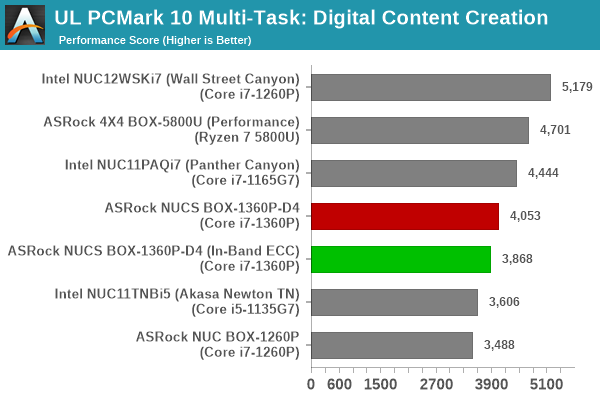
| UL PCMark 10 Load Testing - Productivity Scores | |||
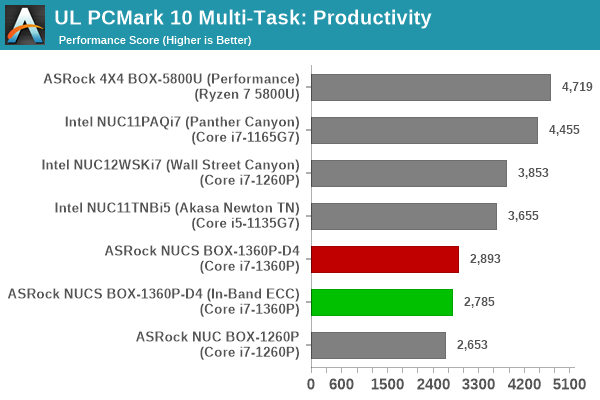
| UL PCMark 10 Load Testing - Essentials Scores | |||

| UL PCMark 10 Load Testing - Gaming Scores | |||

| UL PCMark 10 Load Testing - Overall Scores | |||

Following the completion of the PCMark 10 benchmark, a short delay is introduced prior to the processing of Principled Technologies WebXPRT4 on MS Edge. Similar to the PCMark 10 results presentation, the graph below show the scores recorded with the transcoding load active. Available for comparison are the dedicated CPU power scores and a measure of the performance loss.
| Principled Technologies WebXPRT4 Load Testing Scores (MS Edge) | |||
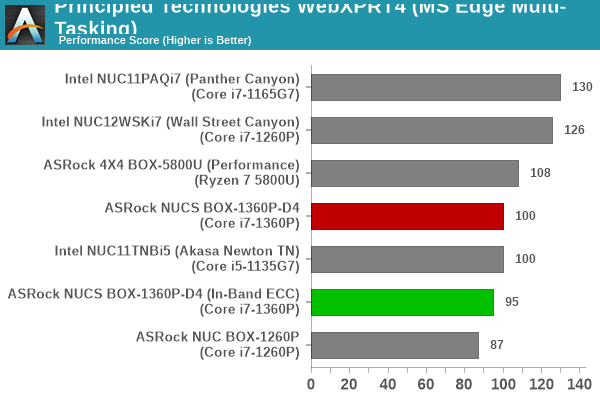
The final workload tested as part of the multitasking evaluation routine is CINEBENCH R23.
| 3D Rendering - CINEBENCH R23 Load Testing - Single Thread Score | |||
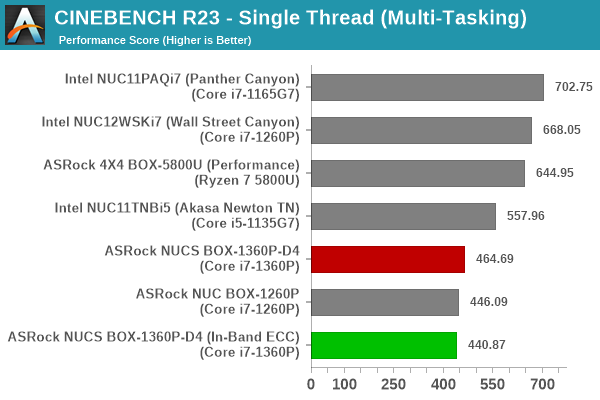
| 3D Rendering - CINEBENCH R23 Load Testing - Multiple Thread Score | |||

After the completion of all the workloads, we let the transcoding routine run to completion. The monitored transcoding rate throughout the above evaluation routine (in terms of frames per second) is graphed below.
| ffmpeg Transcoding Rate and Processor Usage | |||
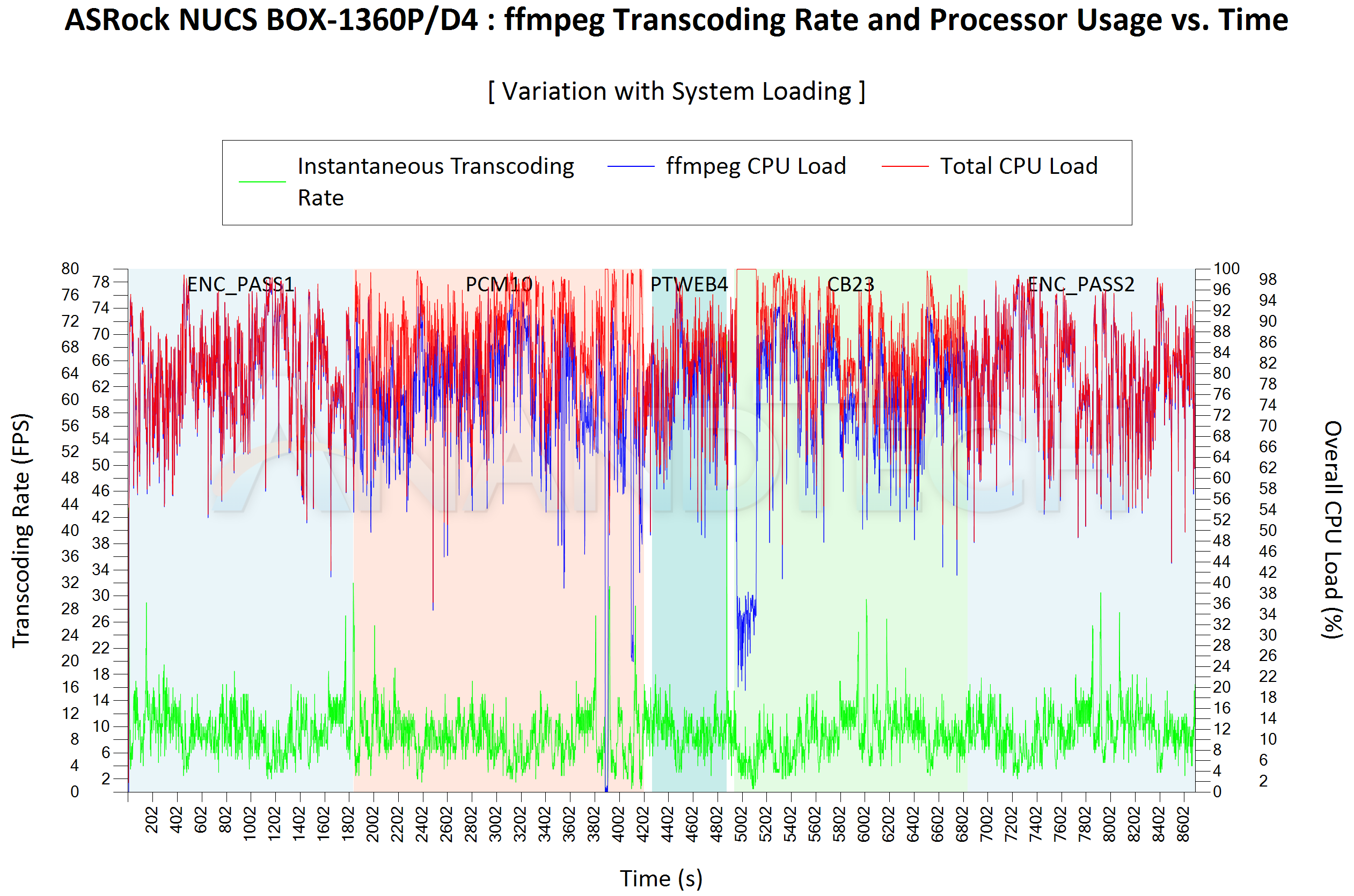
Across all the different workloads, we actually find the ASRock Industrial NUC(S) BOX systems having significant drop in performance compared to similar UCFF systems. It leads one to suspect that Thread Director is simply not able to do the appropriate thread allocation in the systems. Whether this is related to any BIOS configuration is something for the company to look into.
| ASRock NUCS BOX-1360P/D4 ffmpeg Transcoding Rate (Multi-Tasking Test) | |||
| Task Segment | Transcoding Rate (FPS) | ||
| Minimum | Average | Maximum | |
| Transcode Start Pass | 2 | 9.6 | 43.5 |
| PCMark 10 | 0 | 8.37 | 31.5 |
| WebXPRT 4 | 2.5 | 9.18 | 18 |
| Cinebench R23 | 0.5 | 8.4 | 29.5 |
| Transcode End Pass | 2 | 9.51 | 30.5 |
| ASRock NUCS BOX-1360P/D4 (In-Band ECC) ffmpeg Transcoding Rate (Multi-Tasking Test) | |||
| Task Segment | Transcoding Rate (FPS) | ||
| Minimum | Average | Maximum | |
| Transcode Start Pass | 1.5 | 9.28 | 39.5 |
| PCMark 10 | 0 | 8.03 | 27.5 |
| WebXPRT 4 | 2 | 8.9 | 17.5 |
| Cinebench R23 | 0.5 | 8.16 | 27 |
| Transcode End Pass | 1.5 | 9.21 | 29 |
On the positive side, the drop in transcoding frame rate for the NUCS BOX configurations is not as heave as what was seen for other systems.










30 Comments
View All Comments
AntonErtl - Saturday, February 4, 2023 - link
Given that ECC error reports are extremely rare on our systems (with typically 128GB of RAM), I don't worry about having more than one error in 512 bits. Even when a DIMM failed, it resulted in 19 ECC errors (18 uncorrectable) in 14 hours, probably noticed by scrubbing (regular walks through memory to detect whether a bit has flipped).HideOut - Sunday, January 29, 2023 - link
You linked the wrong item for barebones. You linked the old model.ganeshts - Monday, January 30, 2023 - link
Yes, the target page will get updated with the additional new model once Newegg is ready to sell them (as per the info I have from ASRock Industrial). If the URL changes, I will update it. For now, the system has just started entering the channel and is not available for end-user purchase yet.GhostOfAnand - Monday, January 30, 2023 - link
Good work, G-man. I liked the expose on this in-band ECC business. Discussion here: https://www.realworldtech.com/forum/?threadid=2104...notR1CH - Tuesday, January 31, 2023 - link
I would love to see some video tests at non-standard resolutions like "5K" (5120x2160). I have a couple of kiosks that run weird display resolutions and would love to use a NUC to power them, but with the official specs only going up to 4K I've not wanted to risk it not working.abufrejoval - Saturday, February 4, 2023 - link
Well, it stands to reason that the in-band ECC option would be physically available on all recent SoCs, because nobody can resist maximizing cut & paste IP blocks.But with Intel NUCs, there is literally no chance whatsoever they'd support that on non-industrial SKUs, because it's a chance to charge double.
So I wonder if they won't force OEMs to disable that 'rogue' feature, much like AES512 or some of the recent BLK overclocking gimmicks.
I don't even mind paying an ECC premium on hardware I run 24x7, because in those cases compromised data would cost much more. But you can't buy "ECC-variants" of common NUCs and recently even buying ECC variant mainboards of classical desktop chipsets e.g. W680 has become next to impossible, when that was relatively easy say in Haswell times.
Don't know if it's because it's too niche or if Intel is somehow actively discouraging that market. AMD came to rescue until it went with DDR5, where ECC variants were "unobtainium".
All I can say is that I'd be happy to throw €100 at the ability to activate in-band ECC for any SoC that phyiscally supports it, even in a notebook that might get recycled as a server after it's no longer fit for the roadtrips.
AntonErtl - Saturday, February 4, 2023 - link
W680 boards are available in Germany and Austria, but they are expensive (>EUR 440).DDR5 UDIMMs with ECC are available in Germany and Austria from Kingston at ~EUR 210 for a 32GB UDIMM. Note that unlike for AM4, Asrock apparently no longer supports ECC with AM5, currently leaving ASUS as only supplyer for those of us who want ECC. At least AMD officially supports ECC in all socketed Ryzen 7000 CPUs up to now.
mode_13h - Tuesday, February 14, 2023 - link
> Asrock apparently no longer supports ECC with AM5Even ASRock Rack? They've announced AM5 boards, but I'm not sure if they're yet shipping.
AntonErtl - Wednesday, March 1, 2023 - link
There are no Asrock Rack AM5 boards listed on geizhals.at yet, so those may or may not support ECC when they become available.If this is an attempt by Asrock to get us to buy the more expensive Asrock Rack boards, it will fail: We will just buy ASUS.
mode_13h - Sunday, March 5, 2023 - link
BTW, the only ECC DDR5 UDIMMs I'm seeing are all DDR5-4800. I think it'll be a while before we see anything much faster.This could be a point in favor of in-band ECC, if only support for it would be more widespread.